How much EV range do you really need?
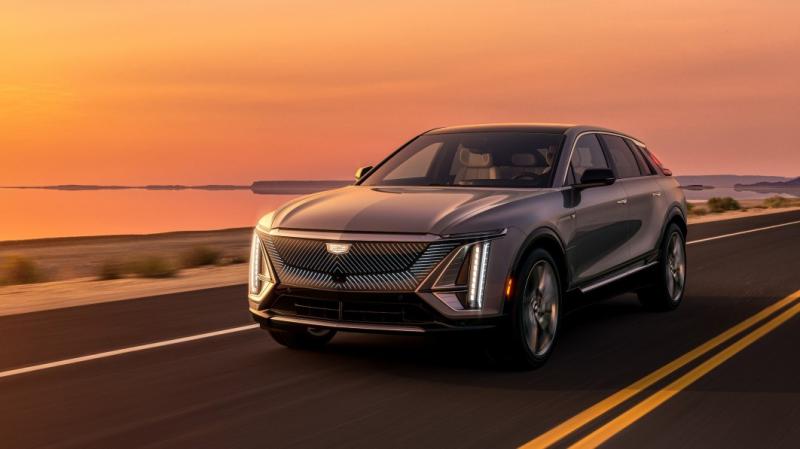

Range anxiety is a fear among people considering an electric car.
But an honest look at your needs, and some great car choices, can ease your concerns.

"This is really risky! We could find hay at any stable, but no! We have to find a pharmacy that sells petrol ...
"These new-fangled machines give me range anxiety!"
Travelers haven't had to think about fuel for over a century, thanks to gas stations on every street corner.
And that's such a good thing, because thinking is so very hard...

EV range anxiety can be put to ease with a simple calculation
Electric car range is one of the top concerns car buyers have when considering whether to make the switch to an EV — a concern so profound, the term "range anxiety" was added to the dictionary to describe it. But just how much EV range is enough? How much range do you actually need? The answer differs for everyone, and we're here to help you figure it out.
The problem is that, like most things in life, we judge a situation based on our past lived experiences. We're used to thinking about cars in internal combustion terms: Quick fill-ups, gaining hundreds of miles of driving range. You'll make dozens of trips, perhaps over weeks, on that one fill-up. That's what "normal" feels like to most of us. So, an electric car with a range of anything less than several hundred miles seems … scary, impractical.
But electric cars can't be thought of like that. They don't work the same way as gas cars — "several hundred miles" is the wrong context. Even with internal combustion, it's rare that we utilize all that range in one sitting.
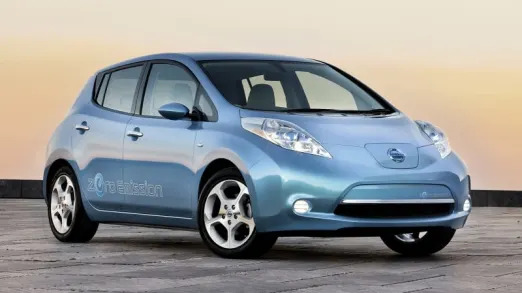
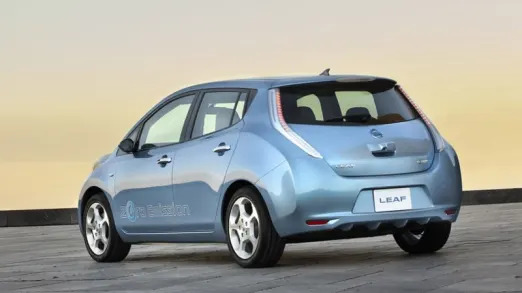
A gas-powered car has a marvelous convenience factor: a vast reserve of energy in a tank that can be quickly and occasionally replenished. But an EV has a convenience factor, too, it's just different: You replenish the battery in many sips rather than one big gasoline gulp, and you do it from the comfort of your own garage. That might not sound like an advantage — until you've experienced the smug pleasure of driving past gas stations, saving $50 or $100 on fill-ups you no longer need.
When the Nissan Leaf was introduced to the world for the 2011 model year, it had an EPA range rating of just 73 miles — and as a practical matter had less range than that when charged to just 80% as recommended for battery longevity. Nissan pointed out that the average daily commute at that time was less than 35 miles, which could easily be replenished in an overnight charge. But many thought the first-generation Leaf sounded like a science experiment.
Except it wasn't. It just required a different way of seeing what a car can be.
We Americans tend to buy cars based on extreme use cases. We buy SUVs but don't go off-road. We buy trucks but use them as cars. We want the ability to take a long cross-country highway trip, but might only do that once a year. That original 73-mile Leaf obviously couldn't road-trip, but it was a clever commuter. When buying an electric car — when buying any car, really — it is important to confront what your actual use case is, not what you hope or imagine it to be.
So how much electric car range is enough? For you? Here are questions to ask yourself.
How far do you really drive in a day?
If you're considering an EV, first do some research — on yourself. Get a notepad and pen, and log your mileage for a few days. For a week. For a month. How much do you really drive in a day? Is it something like the commuting average that Nissan cited? Or more like 100 miles? Even 200 miles? Do you actually do that much driving day-in, day-out? Be honest.
For some broader context, on average, Americans drive 14,263 miles per year, according to the Federal Highway Administration. Which breaks down to 1,188 miles per month — or 40 miles per day. (A stat that grew a smidge since Nissan cited 35, but by now it may have shrunk again given our post-pandemic work-from-home habits.) But let's say the average is 40.
So, is your daily mileage below that average, or at it? Then you'll love an EV. Are you over average? An EV will probably still work great for you. Read on.
Try this formula
Many automakers recommend charging your EV to 80% for daily use and for the sake of battery longevity, reserving a 100% charge for those times when you know you'll need maximum range. Likewise, not typically letting your battery percentage fall below 20% is also good battery longevity hygiene, and it ensures you've got some reserve range if needed, which should provide some peace of mind. So, setting aside that ceiling and floor leaves a typical daily operating range of 60% of a battery's capacity.
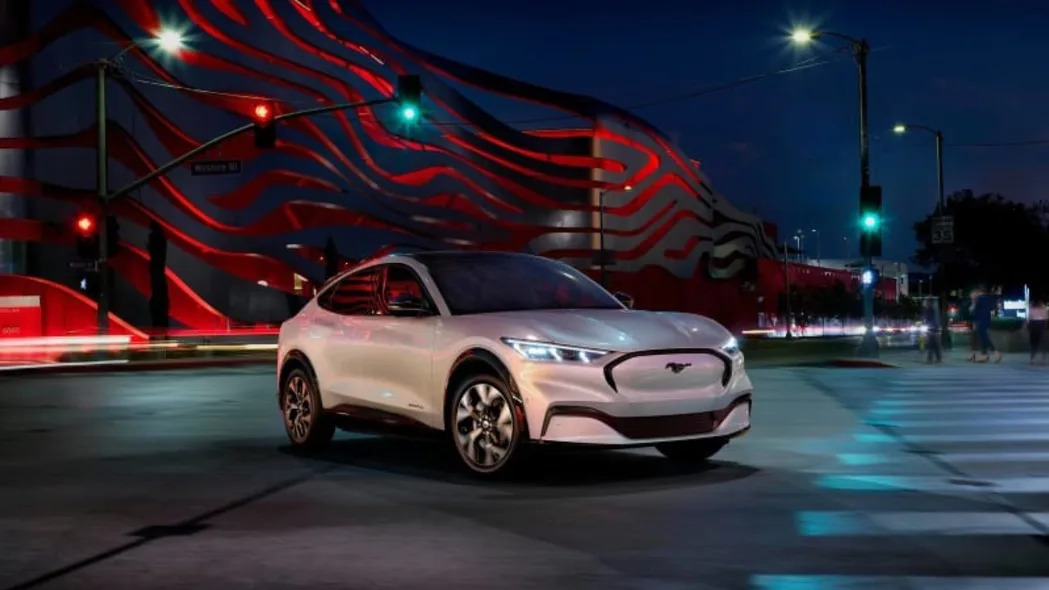
Now pick an EV you're interested in, and look up its EPA range estimate at fueleconomy.gov. Ignore the government's "MPGe" numbers, which for many buyers are not particularly useful, and focus on the range ratings. Now let's use a Mustang Mach-E AWD in GT trim for this example. Its EPA rating is 270 miles, so 60% of that is 162 miles.
Consumer Reports testing found that cold weather can easily cost an EV 25% of range. (Of course, cold weather is hard on gas mileage in conventional cars, too.) If you live in a cold climate and want to be even more conservative with your calculations, then think of our hypothetical Mach-E's range as 120 miles in bad weather.
If your daily driving routine is less than this, you're going to be perfectly comfortable with that car.
Also, keep in mind that many EVs today are excellent at meeting or even exceeding their EPA range, thanks to regenerative braking (the Mach-E is a good example of this).
Next question: Do you have a garage?
Yes, you do have a garage, carport, etc.? Sweet. Conversely, charging an EV is obviously far more difficult for, say, apartment dwellers who don't have a dedicated space or access to a 240-volt outlet, and maybe the time is not yet right for those people to buy an EV.
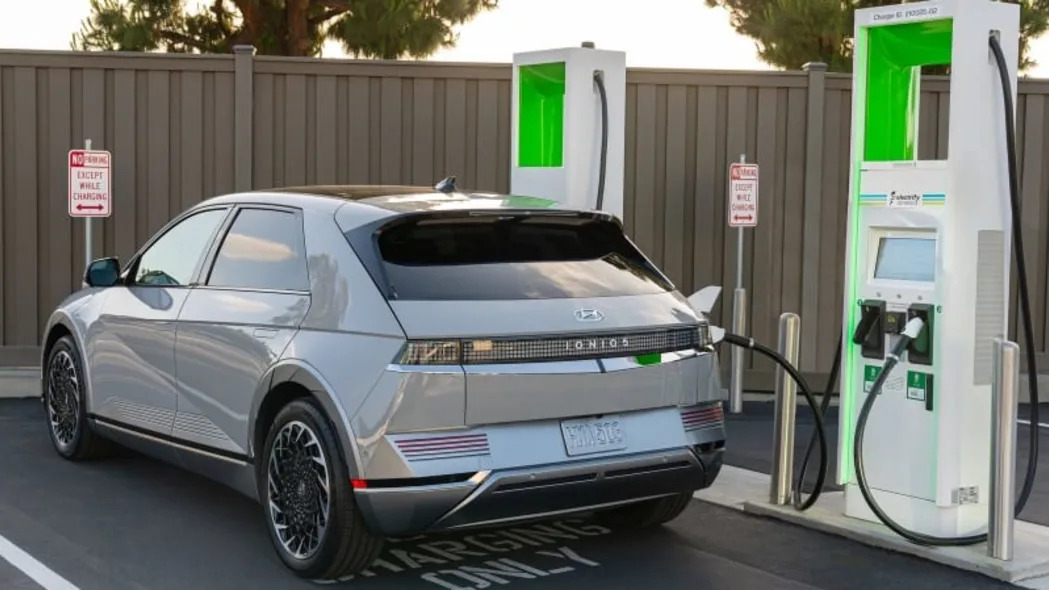
There is a lot of talk these days about public charging infrastructure (or lack thereof). It seems we want DC fast chargers to be as plentiful as gas stations (there we go again, applying internal combustion context to EVs). And we want to be able to charge fast, fast, fast. But ideally, you'll want/need to use public charging only rarely if ever, as it presents drawbacks in terms of time, will cost more than charging at home, and rapid charging perhaps has long-term implications for battery longevity. Home replenishment is an EV's party trick. Read on.
How long is your car typically parked?
We'll return to the Nissan Leaf for this example, in this case the base 2024 Nissan Leaf S. The Leaf is one of the most affordable EVs currently on the market, at $29,280. That's before the $3,750 federal tax credit it's eligible for.
The Leaf S has a relatively modest range of 150 miles (for daily driving, that's more like 90 miles based on our 60% formula) with a relatively modest 40 kWh battery pack. Plugged in to a 240-volt outlet, a Leaf S will receive a full charge in about eight hours, and replenish a 60% use in even less. In other words, it's easily refreshed while you sleep. A Tesla will similarly take about 8-10 hours. Park the car at night, pop it on the charger, enjoy your evening and a good night's sleep, and in the morning you're topped off and good to go. What could be easier?
But bigger isn't always better with EV batteries
There's an important reason why you should be realistic about your daily driving needs and overall use case. If you tell yourself that you want a range of many hundreds of mile on a charge, you for starters are going to be paying a lot more to purchase your car. Just five or six years ago, battery costs made up nearly half the cost of an EV. They are now closer to about a third of the cost, and are projected to continue falling in the years ahead. But if you don't need hundreds of miles of range on a daily basis, then why pay for it? Beyond the unnecessary cost of buying capacity you don't need, a bigger battery will require longer charging times.
Now, let's talk about long highway trips
How often do you road-trip, say for a vacation? Once a year? Twice a year? Five times? In a 2018 study, the University of Michigan's Transportation Research Institute found that EV owners saved about $600 a year powering their vehicles, spending $485 on electricity vs. $1,117 for a gas-powered vehicle. But that study was based on gas prices four years ago — the savings would be far greater at today's higher gasoline prices. And this doesn't even take into account the savings EV owners enjoy from reduced maintenance costs when compared to an internal combustion engine. Ask yourself if it would make sense to drive an EV most of the time, then use all those savings to rent an ICE car for that rare long-distance road trip.
Public chargers are becoming far more common along major highway corridors, if you're willing to do longer layovers and carefully plot your route. But this is a situation for which "range anxiety" is still a reality.
Best of both worlds
You don't have to leap into the EV world without looking back. You might find you can ease your range concerns by simply hedging your bet.
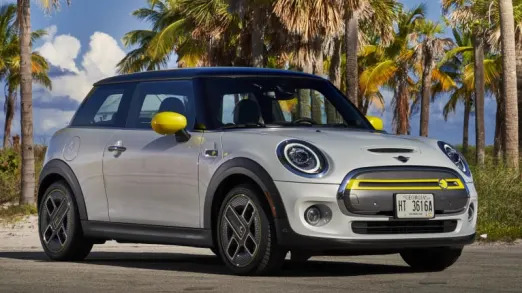
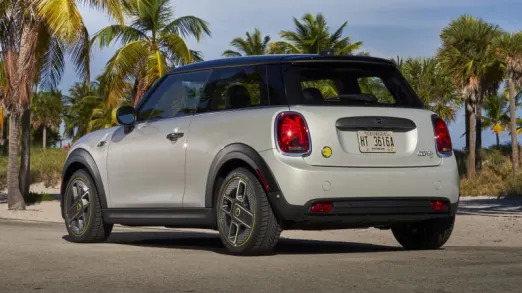
More than half of American households own two or more cars. The best scenario for buying an EV is if you are among that multi-car majority. We're convinced that virtually every two-car family in America could replace one of their ICE vehicles with an EV, and they would gain a powerful mix of capabilities. One car saves gas, the other can be employed when range is a concern. (Interest in hybrids is also surging right now as buyers seek to hedge their bests by having internal combustion and battery propulsion in the same car.)
In the two-car-family situation, we can practically promise you that you'll find yourself driving the EV most of the time. And you'll never again have to ask how much EV range is enough range.
![]() Greg Rasa Feb 6th 2024
Greg Rasa Feb 6th 2024


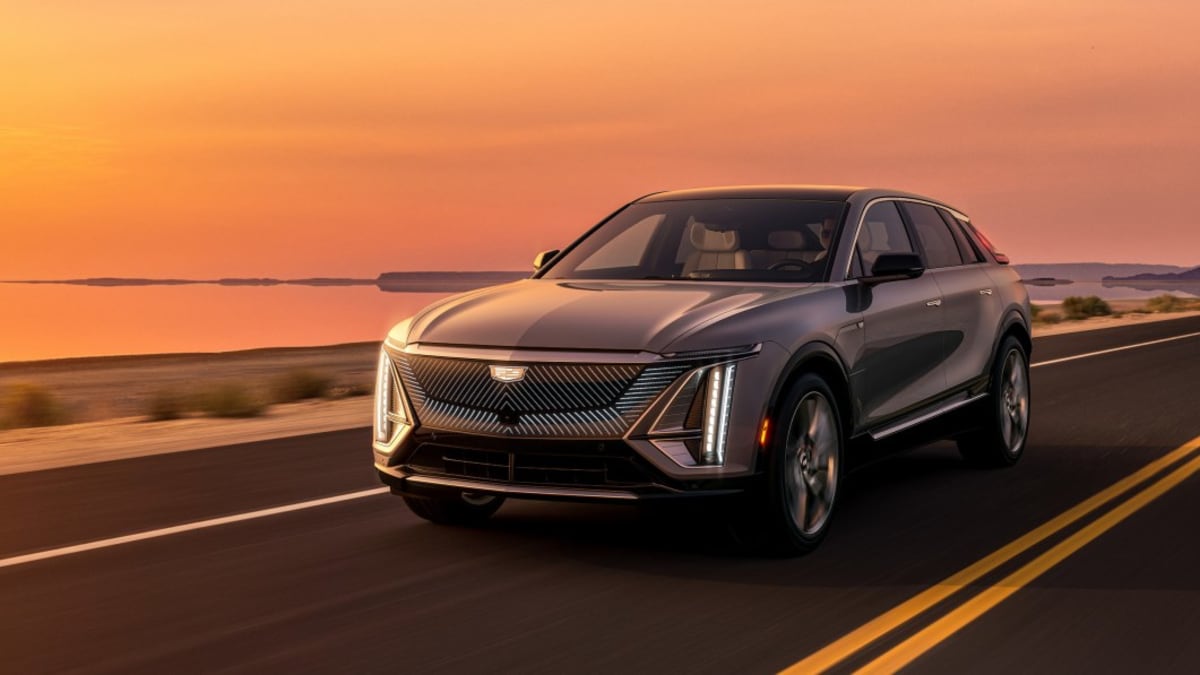
On average, what's your daily drive? That's a pretty simple question, given a few minutes' thought.
The answer determines the battery needed, which in turn defines up-front cost and (because of constantly hauling that weight) running cost. So a driver needs the daily average, and maybe a bit of cushion. But "just get the biggest battery, to be sure!" is foolishness.
My wife and I drive less than twenty miles per day. So a small battery would be sufficient. Sadly, manufacturers have coupled battery size and creature comfort, so the car we'd want - small but quiet and comfortable, with a modest battery and no more than 150 HP - doesn't (yet) exist.
So our little gasoline-powered Buick will have to keep on truckin'. ... ... Until the Chinese arrive.
The most exciting EVs are coming from China – the 5 biggest brands to watch in 2024 | TechRadar
Soon enough, half of the price of these will be tariffs and still cheaper.
Yes. And the Chinese EVs are pretty good.
Good link, there are some very cool cars coming from China and it seems at a resonable price for the consumer.
I like the model where you rent the battery pack and have it changed out by their techs.
A decade ago, a couple different companies tried to set up networks for battery-swapping... but it was too soon.
Today, south Asia has zillions of battery-powered scooters, and more and more of them are battery-swappers. The company that's doing most of the scooter swaps is not starting the same system for cars.
There's SO much going on!
Interesting information, before I retired I spent a lot of time in Asia both SE and North and the scooters in Taiwan were gas and you couldn't breath in Taipai city or in Bangkok, but you also had to worry about being trampled by an elephant in Bangkok.
A few months ago I had my first ride in an EV, it was a BYD model, and although over my lifetime I've owned and driven the best of cars, it was the quietest, smoothest ride I have ever experienced.
We had a Nissan Leaf as an Uber in Seattle once.
Very interesting, Lots of moving bar graphs on the "monitor"
Very quiet.
"Quiet" is innate. Big advantage.
I rode in a Tesla a couple of years ago, fast as hell and quiet which was quite nice.
The torque is out of this world.
unbelievable acceleration in the performance versions.
I was reading an article where Toyota has a battery pack now that has an 800-mile range and should be out in 2026 I think that it was and that will surely change some minds about lack of range.
Being retired I fall into the short trip most of the time but we do take many road trips that are from 4 to 10 hours and that is where I block on the current EVs. That and the current price on the vast majority of them. I do see them as part of the future in autos though.
I saw the other day where GM changed their focus from the EV to the hybrid demanded by their dealers.
There's this company called Hertz that could probably help you out...
LOL is that the same Hertz as this Hertz?
Rental giant Hertz dumps EVs, including Teslas, for gas cars
EVs are great for people who can charge a home. Hertz should not have moved so fast.
Yes, they did move way to fast as others have done, and now they may be moving to fast in the other directions.
Norway is he coldest developed country in the world.
25% EV and 99% of those owners have in home/garage charging stations.
and zero problems with battery temps.
I'm an EV nerd. I track EV news in the US, Europe, and China. Would NT be interested in more articles about them?
I think that some of us would, others are too tied up in politics.
You can count me in on any EV articles.
GOP loyalists tend to be emotionally against EVs. So ½ of the forum (give or take) will likely not want to hear any good EV news. (As you know.)
For that group, NT will start posting everything that you want to know about the newest transport for them, the ''swayback mare''. Slow but steady, and it has that broken-down look while capitalizing on the low consumption of oats but is excellent in unlimited methane release. The first model available will be the Boogidi Mino Coupe (translation the farting coupe). That should keep them happy for ages.
Obviously he was making a humorous analogy about those who resist change — sometimes irrationally.
Do you believe GOP loyalists (in general) are more likely to resist EV technology or embrace it?
When automobiles first came out, the conservative reaction was that they will never replace the horse & buggy. The new-fangled horseless carriages were expensive, always breaking down, required hard to find fuel, etc. Excuse after excuse to resist the change.
Same thing is happening today.
Do you believe GOP loyalists (in general) are more likely to resist EV technology or embrace it?
Do you believe GOP loyalists (in general) are more likely to resist EV technology or embrace it?
Yes as witnessed here year in and year out by the same group on every environmental topic.
Oh there may be a "lib" here and there that says they are skeptics by and large
Libertarians and conservatives want choices and their prefered choices are to drill, refine, burn,
preserve and ignore progress in any other direction.
Conservatives seem to be opposed to everything except naysaying.
'GOP loyalists' is not the same as 'the GOP'.
GOP loyalists tend to be emotionally against EVs.
A lot of people think they are not practical. The reasons have been posted ad nauseum.
LOL, of course, I didn't think it necessary to have to explain it, but I was wrong.
A lot of people are mistaken on diverse topics. That's why informative articles like this one are useful.
Yes, Vic, I know (most people know). Did you see the Pew poll I posted @4.2.10?
The question was not why some people are against EVs but rather the affinity of party to negative views on EVs.
That is easily answered. The president who is trying to force these impractical cars down everyone's throat happens to be a democrat.
BTW, I thought you told us the 14th Amendment question would be a tough decision. Any thoughts on that now?
And yet again you exaggerate. Not only are EVs not impractical but Biden is not forcing them down everyone's throat. Get a grip, Vic.
You do not think this is a tough decision??
The SCotUS does not want this decision. They do not want to be the body that excludes the likely nominee from running (and clearly will not take that route). They also, I hope, do not want to set a bad precedent, let this problem fester, or make legal mistakes.
Seems to me, that is a tough decision.
What is not being considered here is those people like myself that live in small rural and/or isolated areas where EV's are sometimes just not feasible because of infrastructure and short range issues. I live over two hours away from the nearest urban/metropolitan (Tucson) area. Political affiliation has nothing to do with it in my neck of the desert on the border. It solely a matter of practicality.
I have no doubt that your position on EVs is based on practical considerations and not on politics. You are, however, one person.
My point, supported by Pew, is that when you look in aggregate at EV support and opposition, the support tends to come from the Ds and the opposition from the Rs.
Similarly, support for environmentally responsible acts typically comes from the Ds with opposition from the Rs.
Not all Ds and not all Rs, I am talking about macro trends here.
My circumstances would allow me to have an EV since most of my travel is local. Charging up each night would work fine. Except for one thing. I will make some occasional long trips (over 100 miles). I would want to use my car for that, but the car I have (Mini Cooper) would not handle that if I had the electric version. Thus I have not upgraded to the electric version. That is a practicality / convenience call.
However, when the 2025 Mini Cooper arrives with a range of over 200 miles, I will likely upgrade to it.
There are plenty of people in the USA and especially in other countries (consider Europe) where travel is mostly local. This is a very practical use for EVs. So while not everyone has a practical use case for EVs, there is a massive market where the range / convenience works just fine.
You are, statistically, an exception.
Policy should take account of exceptions, but should not be designed for them.
So... neither you nor anyone else is being forced to go electric. In fact, your fuel (gasoline or diesel) continues to be heavily subsidized, otherwise you'd be paying three times what you actually do.
Despite all the financial advantages the state gives to Big Oil, most people - urban and suburban - would save money by going EV.
If range and distance is not a concern for urban or suburban drivers, then it is their choice, the free market will even out without mandates.
Where I live EV is not even a consideration really , and the biggest factor I consider is 4 season reliability over all different terrains and distances. Not just optimal conditions most these things are tested to.
I have seen too many reports of loss of range due to cold weather, and where I live any breakdown in the wrong season for any reason in any vehicle, can be very threatening to ones life.
EV is an interesting idea and has its niche, it's just not compatible to all situations nor will it ever be.
I watched a report recently with a EV (Lightning) owner in Yellowknife NWT (very cold in winter) and he was saying his range was cut in half in the winter. (He only uses it around town so it still works out for him)
I am in your boat. My daily commute is not more than 40 or so miles per day, and our electric is perfect for that. It is even good for trips about 100 miles or so from home, but that is as far as I would take it. For the average commute, an EV works just fine, and its fine in the snow too (just got 2 ft).
The cold effects the battery.... know your equipment...
I've been trying to keep up on the technology. Battery tech is growing faster than production can keep pace.
I bought a new car not long ago and would have gotten an EV if I could have found one. Let alone one in my price range. My normal drive range is 1 mile from my parking space to my office building parking lot. My only personal issue with EVs is I don't have a garage to park one inside. Maybe when I move out of town and it's an hour commute I'll build a big garage and get an EV.
Yes, indeed! Their chemistry is evolving fast, in several directions, getting less exotic, cheaper, ... ...
Have you looked at electric bikes? Cargo bikes aren't cheap, but they very practical... and you don't need a garage.
I did, but when I was looking to buy they too were hard to get and too expensive. I ended up with a Honda Ruckus scooter. It gets a 100 miles to a tank and the tank is little over a gallon. I drive it to work all summer when it's not raining. I can drive it right up the ramp at my work building, wheel it into the lobby and park it inside.
Costs have come down a lot so maybe someday I can sell the scooter and get a bike.
Good solution.
From what I've read, the zillions of exhaust-spewing scooters of South Asia are very quickly being replaced by electric scooters with swappable batteries.
What about disposal EV batteries? Said to be not good on the environment.
That might be true if batteries weren't really expensive, wirh expensive materials. There is already a significant industry creating grid-level electrical storage from batteries that are no longer satisfactory for cars, but quite capable for less intense use-cases.
Recycling is ramping up, also because there's money to be made.
This is new tech. What was "true" a couple years ago... isn't any more.
"Several hundred miles" is not the wrong context and the fact that electric cars can't be thought of in that way is the heart of the problem. If my truck runs out of gas, the only concern or inconvenience is how far I have to walk in order to get gas. If some weather event knocks out power to my house for a week (not hypothetical) I don't have to worry about how I'm going to get to work. Hence...
Isn't really comparable. The orders of magnitude of societal breakdown are very different. That is, the inability to get gasoline for my truck would carry implications orders of magnitude greater than no being able to charge it because a transformer blew in my neighborhood.
True, but not necessarily wrong. When a wind storm knocked out power to my house for more than a week my employer didn't give a damned. They only cared that I showed up on time and did the work I was hired for. Had my ability to do so been tied to electricity rather than gas, it would have been much more difficult to meet my obligations.
I could say more but this should be enough to illustrate how some of us think about EV's. We tend to think in terms of "what if" and because of that, we don't really trust EV's.
What if the planet burns?
If the power goes out your EV still works. You can still drive it to and from work.
I'm not against buying an EV eventually, like some others due to location now is not the time. I live 3 hours away from the nearest city with charging stations and currently none of the very few gas stations enroute have that capability and in winter it can be very cold this far north. Unfortunately I have to drive to the city at least once a month, if I didn't then an EV would be workable.
Not a good buy for you, at least not yet, given your geographic constraints.
Between dropping the kids off, going to work, picking the kids up an going home, I drive around 30 miles a day. Add in some errands and it may be around 40 or so. My EV is perfect for that. Only costs about $20 a month.
But that is the thing, my wife and I know the limitations, and we don't push it beyond what we know it can do. Great for around town and going about 100 miles out of town, but past that I wouldn't recommend it. Then you have to start looking for charging stations and all that nonsense. The battery tech just isnt there for long stretches.
For 90% of people's commutes, an EV as it is will be just fine.
That's the message! EVs aren't for everyone.... just 90%.